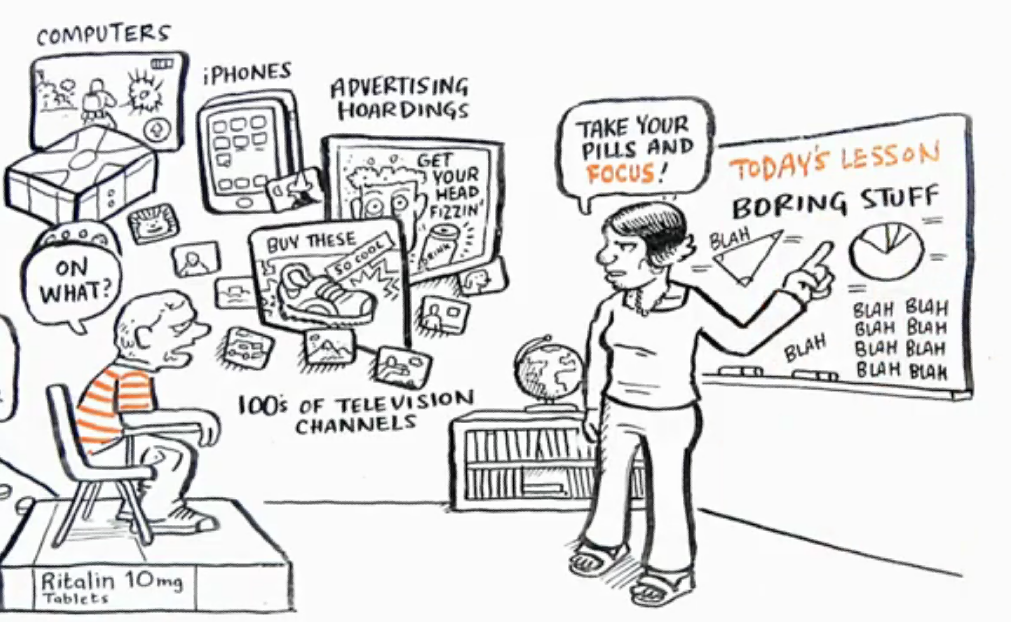
If facebook were a country, it would be the third largest in the world?
There are over 12 billion searches performed on google each month?
The number of text messages sent and received daily now exceeds the total population of the human planet?
Now that you know, how will you let it inform your teaching? One youtube video entitled Pay Attention suggests having students text individuals outside their school to gather data for the class to use in lessons on topics like graphing, food preparation, and economic trends. Since we live in an age of digital learners, this video argues, why not use the technology our students love to engage our students and teach them more effectively? Another thought provoking video, Did You Know? calls attention to the rapid technological change going on in the world today and points to the need to prepare students for jobs that don't yet exist and that will utilize technologies that haven't yet been invented.
I appreciate the arguments these videos make about the urgency of incorporating technology in the twenty-first century classroom in a way that is relevant and engaging. Yet there is also a part of me that isn't fully convinced of the feasibility of their argument given the population of students I'm likely to work with.
Technology can be extremely expensive. If Buffalo private schools like Elmwood Franklin, where most of the students are middle class and Caucasian, can afford to put ipads into the hands of all their students, this is hardly the case in most of the schools attended by children of color on Buffalo's East and West Sides. Rather, in many of these classrooms, teachers have to reach into their own pockets just to purchase basic classroom supplies, not to speak of expensive technology. The students in these mostly low-income neighborhoods, and especially those who are recent immigrants and refugees may not have personal cell phones, ipods, or internet access at home, as these videos seems to suggest every teenager today does. It makes me wonder whether technology is just another area which will continue to accentuate the gap between the "haves" and the "have nots" in our society.
I also wonder whether catering to our students' 24/7 connection to technology is all good. In a speech given at the RSA, Sir Ken Robinson makes the following statement, "Our children are living in the most intensely stimulating period in the history of the earth. They're being besieged with information and calls to their attention from every platform; computers, iphones, advertisements, and hundreds of television channels. And we're penalizing them for getting distracted..."
If anything, this statement makes me wonder whether many kids (and adults!) today haven't developed an unhealthy addiction or over-dependance on technology. If our constant exposure to technology makes it difficult for us to commit to and focus on a single task, or results in us being disconnected from what's happening around us in the here and now, is that really a good thing? I can't tell you how many individuals I've talked to who've commented on the fact that while we now have the capacity to build larger and larger electronic social networks, many of us seem to be losing touch with the people immediately present around us, who we interact with in our daily lives. After all, how many of us have tried to carry on a conversation with someone only to have them be texting or checking facebook on their iphone the entire time they're talking to us.
Yes, technology provides students with some incredible possibilities for learning and connection, but perhaps this should be tempered with fostering healthy relationships and connections with the "flesh and blood" individuals who inhabit their physical lives. Maybe in this age of over-digitalization part of our role as instructors should be not only to help students use technology as a tool for learning, but also to help them "unplug" and relearn how to engage in healthy, non-digital interactions.




You have pointed out an important aspect of the technological revolution and that is that it does accentuate the difference between the "haves" and the "have-nots." Thankfully, good pedagogy is not dependent on technology, but if a teacher has access to technology, he/she should be aware of how to utilize it to enhance learning. Although many schools are ill equipped regarding technology, many public libraries offer computer access. Whenever possible, I feel that teachers should encourage students to become as "computer literate" as possible since it will be to their advantage in the future.
ReplyDeleteThe second point in your post that resonated with me is regarding f2f social skills. I totally agree with your statement that "Maybe in this age of over-digitalization part of our role as instructors should be not only to help students use technology as a tool for learning, but also to help them "unplug" and relearn how to engage in healthy, non-digital interactions."
"Good pedagogy is not dependent on technology, but if a teacher has access to technology, he/she should be aware of how to utilize it to enhance learning. " It might be misleading to believe that technology is the essence of good teaching. Rather, it is good pedagogy - how to teach, how to organize the students and facilitate them learning effectively. If we are thrown into an island without access to modern technology, we should still be able to use chalks and board to teach.
DeleteMoreover, "unplug and relearn how to engage in healthy, non-digital interactions" is a good point. One of the potential drawbacks of digitalization is that students tend to be less socialized in terms of face to face interaction. Interpersonal skills tend to be ignored. However, language learning is not only vocabulary and grammar, but also sociolinguistic and strategic competence which is actually of more importance in the real world communication.